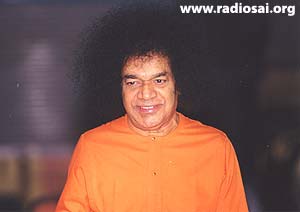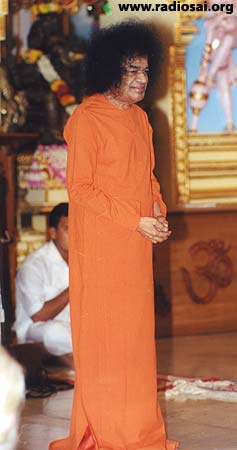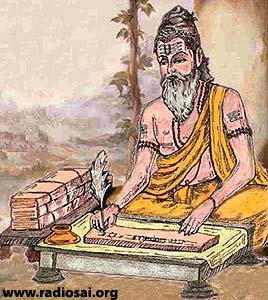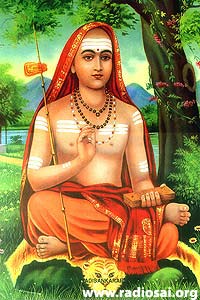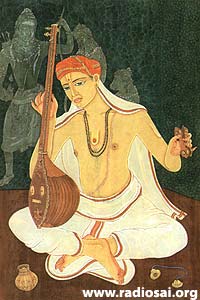 |
 |
 |
Volume
6 - Issue 03
MARCH - 2008 |
CONVERSATIONS WITH SAI Satyopanishad - part 2:
CHAPTER 1 - THE INDIA ETERNAL Anil Kumar (AK): Swami! Kindly tell us what is to be done in our country now?
Bhagavan: You don't have to protect your country now. You should protect and uphold Sathya and Dharma (Truth and Righteousness). You should of necessity follow these twin principles. They will protect the entire universe. You should develop love for the universe in all its vastness and magnitude. Love all and serve all. You should rise above the narrow limits of caste, creed and nationality. You should believe in the brotherhood of man and the fatherhood of God. You should never waste time. Gratitude must be expressed by rendering service to the society in which you are born, grew up, made money and earned reputation. Be patriotic and strive for integration, harmony, peace and security in society. You should follow and uphold the great and unique Indian culture. Cultivate human values and realise the divinity within you. Politics without Principles, Commerce without Morality, Science without Humanity, and Education without Character are not only useless, but also dangerous. You should be a perfect, ideal man. You are from God. You are the spark of the Divine. Hence, your qualities should be daiva, divine and not dayyam, demonic. You say, "I am a human being". This is only half a truth. The other half is, "I am not an animal". You should give up animal qualities. If you have both bestial and human qualities, it means your mind is dual. The man with a dual mind is half blind. If you place a ceiling on your desires, you will be happy. He who has many desires is the poorest man. The man with contentment is the richest man. Guna, virtue is more important than ana, coin. You should know the purpose and the goal of life. Life is not for eating, drinking, and sleeping alone. Animals also do the same. What is your specialty, then? God has gifted you this life in order that you may know, experience and realise the divinity within you. Morality and integrity are very important. Nitiye jati, morality, indeed, is national character. A Telugu verse runs as follows: Adivadalitivo kotikante hinudavu, Without character, you are worse than a monkey. The prestige of a nation depends on its morality. That nation alone deserves to be called a nation when it truly maintains high standards of morality and individuality. You should always remember these three important points. The first is: do not trust the way of the world. Sometimes it not only deludes and distracts you, but betrays you also. The second is: never forget God who is always with you, in you, above you, below you. Nay, you are God. The third is: do not fear death, as it is sure to take place. In fact, death is the dress of life. Follow the sacred path in life by maintaining unity in thought, word and deed.
There is one more thing I want you to note. Open your heart and close your mouth. Today, people speak what they don't really mean; their hearts are full of jealousy, pride, envy, and what not. I want you to open your heart and be free from all those that pollute it and close your mouth. Dedicate your life to service. Keep God as your ultimate aim and goal. This is what I mean when I say, "Hands in society and Head in the forest." You should share your precious knowledge and valuable experience with others. You should share Sai's message with others. Have faith in yourself first and then you can trust God. The real cause of the problem of the present day lies here. You don't have faith in yourself. You have no self confidence. Consider grama seva, rural service as Rama Seva, service to God. Explain clearly to the villagers issues like hygiene, health, cleanliness, and organise medical camps. Ensure to everyone water supply, especially drinking water supply. Tell them about the evil effects of smoking and drinking. Help them to get rid of these bad habits. If you work and serve mingling closely with the local people, in course of time, they will be able to work independently and become self reliant. Service to man is service to God. Service is a greater and higher spiritual path than meditation, penance, worship and chanting. Serve the poor and the needy. Don't be selfish. Don't give any scope for jealousy, pride, and attachment. Develop virtues like devotion, adherence to truth, discipline, broadmindedness, and never yield to pomp, pride, and egoism. Bad qualities are like tigers while noble qualities are like cows. Will tigers allow cows to live? No. So, don't have any evil tendencies in your heart. You should imbibe human values more and more, and live up to the ideals you cherish. AK: Swami! Kindly tell us about Vasishtha and Visvamitra, the two sages who are very prominent in the Ramayana? Bhagavan: In ancient days, kings were always guided by their preceptor. They consulted him on all major issues. That was how Truth and Righteousness were maintained and upheld. History shows instances when kings approached their gurus for blessings and guidance, and thus became great. You know how King Krishnadevaraya was guided by his mentor and preceptor, Vidyaranya, and Emperor Sivaji by Samartha Ramadas. Rama and Lakshmana followed Sage Visvamitra, learnt archery from him and killed demons like Khara and Dushana who were obstructing and desecrating Vedic rituals in the forest. Thus, Visvamitra was instrumental in demonstrating to the world at large the valour and expertise of Rama and Lakshmana. Visvamitra also taught Rama the most sacred mantra, the Gayatri. He was also responsible for the divine wedding of Sita and Rama, which was in essence a union of prakriti, matter and purusha, energy, the Absolute One. He was and is the mitra, friend, of visva, the entire Universe, and so the name of the sage has been so apt and befitting. Visvamitra was the one who gave Gayatri Mantra to mankind. As he was growing in spiritual stature, he wished to be called Brahmarshi by Vasishtha. He was always competitive and envious of Vasishtha to the extent of even resolving to kill him. On a full moon day he planned to kill Vasishtha and was holding in his hand a big stone to be thrown on his head. Meanwhile, he heard Vasishtha tell his wife Arundhati how bright and beautiful the moonlight was and how it was equal to the power of the penance of Visvamitra. His mind immediately changed and he fell at the feet of Vasishtha and the latter addressed him as Brahmarshi since he had conquered his ego. AK: Swami! Among the sages, how is Valmiki noteworthy?
Bhagavan: The Ramayana was both composed and recited during the time of Rama's incarnation. As for the great sage and ascetic Valmiki, besides being a contemporary of Rama, he, as the author of the Ramayana, is the very first poet. He gave shelter to Sita, renowned for her virtue and chastity, brought up her sons, Lava and Kusa, and taught them archery and all the arts. Thus, he played a vital role in the Ramayana. Having completed the Ramayana, he thought deeply about popularising such a great work. At that juncture, Lava and Kusa came forward and took a vow in the presence of Valmiki and other distinguished sages that they would themselves sing the Ramayana and offer its nectar to people all over the world. Thus, Valmiki has the unique distinction of composing the divine Ramayana as Rama's contemporary and having it sung in Rama's presence. Valmiki proclaimed to the whole world the ideals and divinity of Rama, the protector of the world and the inspirer of His muse. Thus, it was only from the Tretayuga that the divinity within humanity began to shine forth. The purpose of the incarnation of Rama was to pass on to mankind the whole duty of man. What is happening today is exactly the same phenomenon. You would have noticed how in the present avatar too, biographies are written by contemporaries, and the Divinity is acknowledged, worshipped, experienced, and celebrated all over the world. That all this is happening during the time of the incarnation is another parallel to Rama's descent. The same Ideal! The same Love! The same Message, viz., the practice of Sathya and Dharma. AK: Swami! We heard about King Dasaratha, the yoga called 'putrakameshti', and so on. Kindly tell us something about King Janaka. Bhagavan: Janaka was a Rajayogi, a man of great wisdom, utterly devoid of the sense of the body. Therefore, he came to be known as videha, one without attachment to the body. As the daughter of that King, Sita came to be known as Vaidehi. Janaka was an ideal king possessing immense devotion to the preceptor, extensive knowledge of the Sastras, and the spirit of renunciation. He performed Sita's marriage as his bounden duty. Later on, Rama left for the forest along with Sita and Lakshmana. Though their stay in the forest stretched into years, Janaka never set foot in the forest. Such was Janaka's abounding wealth of jnana and vairagya (wisdom and renunciation). AK: Swami, we hear that Adi Sankara died at a young age. What could be the reason?
Bhagavan: It is true that the founder of the doctrine of advaita, nondualism, died young. He wrote commentaries on three important sacred texts known as Prasthanatraya, viz. the Upanishads, the Brahmasutras, and the Bhagavadgita. Besides, emphasising jnana (the path of knowledge), he composed a large number of hymns on bhakti (devotion). He traveled all over the country and established pithas - centres of worship and spiritual learning. He symbolises Sanatana Dharma, the ancient, timeless spiritual culture of this land. Adi Sankara went to the ancient pilgrim centre, Kasi where he prayed to the presiding deity, Visvanath to pardon him for the three mistakes he had committed. The first mistake happened to be his behavior contrary to what he had been stating all along. Though he said, Vasudevas sarvamiti, that is, “God is everywhere”, he had come to Kasi to see God. The second mistake was that even while knowing that God is beyond our comprehension and description, yato vaco nivartante, he tried to write books on divinity. The third mistake was that while knowing that one God manifested Himself as many, ekoham bahu syam, and that the same God is present in everyone, atmavat sarva bhutani and that awareness is in everyone, prajnanam brahma, he organised mathas, centres of learning considering his disciples separate from him. You may also have heard another episode connected with his life. He prayed to his mother for permission to become a Sannyasi, a lifelong celibate. She didn't accept the proposal initially. One day Sankara went to a nearby river to have a bath. Suddenly a crocodile caught his feet. Then he started crying, "Mother! Mother! This crocodile is pulling me into the water. It is not going to leave me until you permit me to become a sannyasi (renunciant)". His mother at last gave her permission and Sankara was released by the crocodile. The inner meaning of the episode is that the river is comparable to samsara, worldly life in general, and the crocodile to visaya, sensual pleasure. Man is dragged into the river of life by the crocodile of worldly pleasure. Release is renunciation or detachment. Sankara shuffled off his mortal coil soon after completing the tasks he had set for himself, because he was sure that his mission would be carried further by his disciples, the torchbearers of his philosophy and that his theory of nondualism would be widely spread and propagated. His disciples too were of the stature and eminence to carry on his mission successfully.
AK: Swami! Tyagaraja, very well known as a devotee of Rama, composed kritis (hymns in praise of the Lord) which are sung even today. What is special about them? Bhagavan: There are many names of devotees who composed devotional songs all over the world. God also responded to them. Those songs make you ecstatic and sublime. But the hymns of Tyagaraja have a specialty about them. Every song of his is related to an incident in his life. For example, when the King of Tanjore sent him jewels, provisions and costly presents, Tyagaraja mildly and politely rejected them and put to himself a question in the form of a kriti: nidhi cala sukhama ramuni sannidhi seva sukhama that is, is it money that makes you happy or is it nearness to God? Once his brother threw all the idols worshipped by Tyagaraja into the Kaveri River. Tyagaraja cried piteously for this loss. One day when he was taking his bath in the Kaveri, by the grace of Rama he could get those lost idols, and holding them in his palms he brought them home singing, rara ma inti daka raghuvi ra sukumara: "Lord Rama! Please come home." In a music concert in the court of a king, he sang paying obeisance to all the distinguished people present in the assembly, endaro mahanubhavulu andariki vandanamulu that is, “There are many noble and great people here, my humble pranams to all of you." Like this, every song composed by Tyagaraja is associated with some real life occasion or incident. The hymns of Tyagaraja reflect practical devotion and surrender. (To be continued...) – Heart2Heart Team
|
Vol 6 Issue 03 - MARCH 2008
|
Best viewed in Internet Explorer - 1024 x 768 resolution. |


